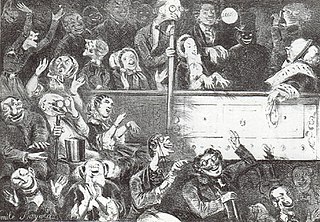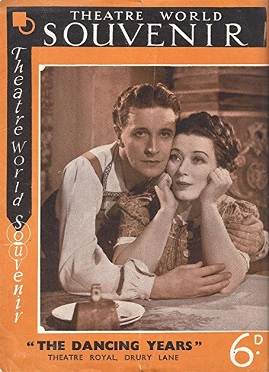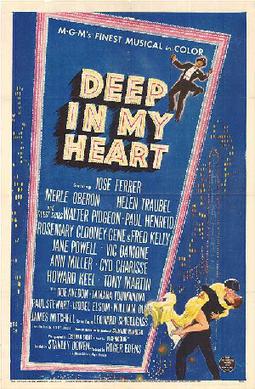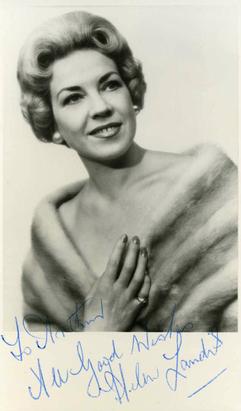
Operetta is a form of theatre and a genre of light opera. It includes spoken dialogue, songs, and dances. It is lighter than opera in terms of its music, orchestral size, length of the work, and at face value, subject matter. Apart from its shorter length, the operetta is usually of a light and amusing character. It sometimes also includes satirical commentaries.

Ivor Novello was a Welsh actor, dramatist, singer and composer who became one of the most popular British entertainers of the first half of the 20th century.

The Dancing Years is a musical with book and music by Ivor Novello and lyrics by Christopher Hassall, set in Vienna, from 1911 until 1938. It follows a Jewish composer and his love for two women of different social classes, with an ending set against the background of Nazi persecution.

Oh... Rosalinda!! is a 1955 British musical comedy film by the British director-writer team of Michael Powell and Emeric Pressburger. The film stars Michael Redgrave, Mel Ferrer, Anthony Quayle, Ludmilla Tchérina and Anton Walbrook and features Anneliese Rothenberger and Dennis Price.

Christopher Vernon Hassall was an English actor, dramatist, librettist, lyricist and poet, who found his greatest fame in a memorable musical partnership with the actor and composer Ivor Novello after working together in the same touring company. He was also a noted biographer of Rupert Brooke and Edward Marsh.

The Guinea Pig is a 1948 British film directed and produced by the Boulting brothers, known as The Outsider in the United States. The film is adapted from the 1946 play of the same name by Warren Chetham-Strode.

Tea for Two is a 1950 American musical romantic comedy film starring Doris Day and Gordon MacRae, and directed by David Butler. The screenplay by Harry Clork was inspired by the 1925 stage musical No, No, Nanette, although the plot was changed considerably from the original book by Otto Harbach and Frank Mandel; and the score by Harbach, Irving Caesar, and Vincent Youmans was augmented with songs by other composers.

Gay's the Word is a musical with book and music by Ivor Novello and lyrics by Alan Melville. The musical is a backstage comedy that parodies Novello's own swashbuckling Ruritanian romance plots. The story centres on Gay Daventry, a bankrupt operetta producer who opens a drama school at her country house. This also turns out to be unsuccessful, but it leads to a theatrical comeback for Gay.

Deep in My Heart is a 1954 American MGM biographical musical film about the life of operetta composer Sigmund Romberg, who wrote the music for The Student Prince, The Desert Song, and The New Moon, among others. Leonard Spigelgass adapted the film from Elliott Arnold's 1949 biography of the same name. Roger Edens produced, Stanley Donen directed and Eugene Loring choreographed. José Ferrer played Romberg, with support from soprano Helen Traubel as a fictional character and Merle Oberon as actress, playwright, librettist, producer, and director Dorothy Donnelly.

Odette is a 1950 British war film based on the true story of Special Operations Executive French agent, Odette Sansom, living in England, who was captured by the Germans in 1943, condemned to death and sent to Ravensbrück concentration camp to be executed. However, against all odds she survived the war and testified against the prison guards at the Hamburg Ravensbrück trials. She was awarded the George Cross in 1946; the first woman ever to receive the award, and the only woman who has been awarded it while still alive.

King's Rhapsody is a musical with book and music by Ivor Novello and lyrics by Christopher Hassall.

Trio is a 1950 British anthology film based on three short stories by W. Somerset Maugham: "The Verger", "Mr Know-All" and "Sanatorium". Ken Annakin directed "The Verger" and "Mr Know-All", while Harold French was responsible for "Sanatorium".

Master of Bankdam is a 1947 British historical film directed by Walter Forde and based on the 1940 novel The Crowthers of Bankdam by Thomas Armstrong. It stars Anne Crawford, Dennis Price, Tom Walls, Stephen Murray, Linden Travers and David Tomlinson. The story concerns two generations of brothers who struggle for control of the family business in 19th century Yorkshire.

Your Witness is a 1950 British drama film directed by and starring Robert Montgomery, Leslie Banks, Felix Aylmer and Andrew Cruickshank. It was released in the U.S. as Eye Witness.

Murder Without Crime is a 1950 British crime film directed by J. Lee Thompson and starring Dennis Price, Derek Farr and Patricia Plunkett. J. Lee Thompson also wrote the screenplay adapted from Double Error, his own successful West End play.

No Place for Jennifer is a 1950 British film directed by Henry Cass and starring Leo Genn, Rosamund John, Guy Middleton and Janette Scott.

The Daughter of Rosie O'Grady is a 1950 American musical film directed by David Butler. It stars June Haver and Gordon MacRae. The story is mostly about the lives of musical performers in New York in the closing years of the 19th century. Most of the songs were written for the movie, but "Rose of Tralee" dates from the 19th century, and the song "The Daughter of Rosie O'Grady" dates from 1917.

Money and the Woman is a 1940 American drama film directed by William K. Howard and written by Robert Presnell Sr.. The film stars Jeffrey Lynn, Brenda Marshall, John Litel, Lee Patrick, Henry O'Neill and Roger Pryor. The film was released by Warner Bros. on August 17, 1940.

Helen Landis was an English singer and actress, known for her performances in musical theatre, operetta and opera, especially roles in early British productions of Rodgers and Hammerstein's and Ivor Novello's musicals and the contralto roles in the Savoy operas with the Gilbert and Sullivan for All company, with whom she toured extensively for more than 20 years.

Maidie Andrews was an English actress and singer who, in career that spanned six decades, was a child actress and later a stage beauty who appeared in musical comedy including the original London productions of No, No, Nanette (1925) and Cavalcade (1931). The latter years of her career saw her taking roles in television and film.




















